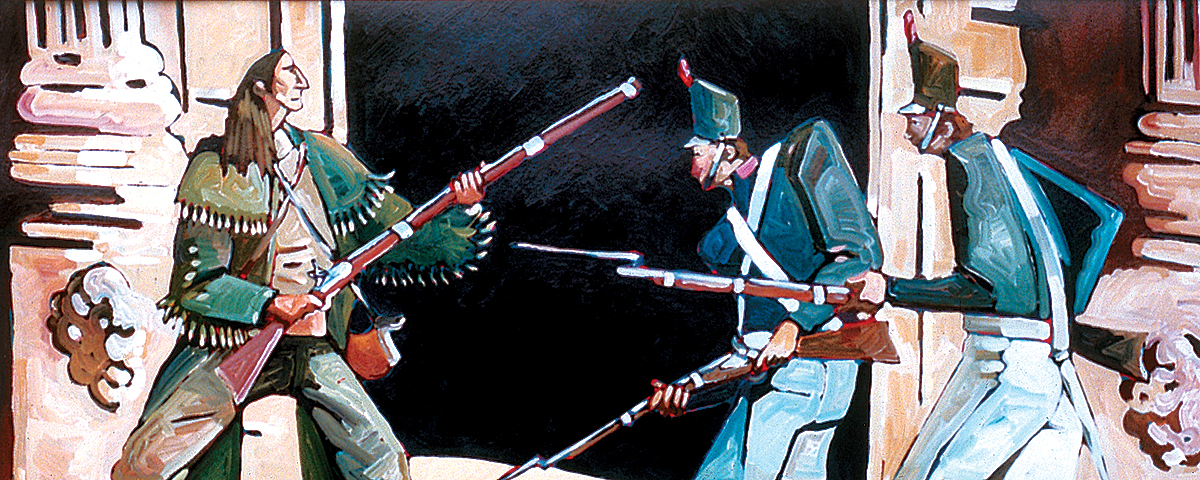Crockett & His Band
In 1834 U.S. Rep. David Crockett’s Philadelphia publishers, Carey & Hart, released A Narrative of the Life of David Crockett of the State of Tennessee, which, historian Paul Andrew Hutton writes in his introduction to the 1987 printing, has “enduring popularity” and recounts “one of the most beloved of our national obsessions: the success story of the self-made man.” The autobiography spread Crockett’s fame, but political and financial setbacks convinced him in 1835 to strike out for San Antonio, Texas. If he had updated his autobiography while holed up in the old mission there in February 1836, that work would have been worth a fortune, since, as Hutton wrote, “The Alamo elevated the pioneer-politician into a heroic martyr.” Of course, only his family or others would have enjoyed that fortune, Crockett having died with most of the other Alamo defenders that March 6 when the Mexican army ended its siege with a predawn attack.
Carey & Hart capitalized on the dead hero’s name cachet by turning out Col. Crockett’s Exploits and Adventures in Texas. It includes, author Bob Palmquist points out in our February 2017 cover story, “excerpts from a bogus ‘journal’ Crockett supposedly kept up to the day before Mexican troops stormed the Alamo walls.” In that spurious account Crockett goes to Texas with four fictional companions, a colorful quartet that pops up in subsequent printed works and films. “This is unfortunate,” writes Palmquist, “as it diminishes the real men of the Tennessee Mounted Volunteers and obscures the motives behind those who launched the Texas Revolution.”
Palmquist tells us something about those real men of the Tennessee Mounted Volunteers, also known as “Crockett’s band.” None became household names except for Crockett, who even gained renown for sawing on a fiddle to amuse the men, though fellow volunteer Micajah Autry was an accomplished violinist. “One wonders,” writes Palmquist, “if Autry…took a hand in providing music or simply looked on, wincing, as Crockett attempted a tune.”
Crockett, who declined a formal command and served as a “high private,” has stolen the thunder from his fellow volunteers, but Hutton is OK with that: “Crockett was the natural leader of any group he was attached to, including the men he journeyed with to the Alamo. In the fort he was also recognized as an immediate informal leader, along with William Travis and James Bowie. He was, after all, one of the most celebrated Americans then living—he was a really big deal. He was not overrated then and is not overrated now.”
Crockett’s flame burns brightest in two states—Texas, of course, and his native Tennessee, where he was born on a mountaintop (or somewhere just east of Knoxville) on Aug. 17, 1786. From a dirt-poor backwoods upbringing he gained notoriety for killing bears the way “Buffalo Bill” Cody later achieved renown for killing bison, served in the military and Tennessee politics, then ultimately made his mark in Congress. The legendary brag he was “half-horse, half-alligator and a little attached with the snapping turtle” (credited to Crockett in an 1883 biography, though in fact lifted from a stage play about him) garnered attention, while his motto, “Be always sure you’re right—then go ahead!” (from his Narrative of the Life) boosted his fame.
The Alamo fight set his legend in stone. “Crockett’s death sent him soaring into the front ranks of American heroes,” Hutton says, “and shifted him from a symbol of the rise of the West and Jacksonian democratic politics into a martyr to our Manifest Destiny to conquer the continent. The Alamo made Crockett—but Crockett also made the Alamo. The battle would be a regional, not national, historic moment without him. Crockett is to the Alamo what George Custer is to the Little Bighorn.” The other Tennessee Mounted Volunteers all died with Crockett, but one wonders whether they would have begrudged him his fame. WW





